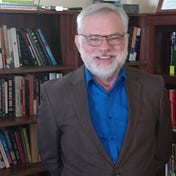I’m a retired professor of international relations. Retirement wasn’t my choice: I have Parkinson’s disease, and I grew too exhausted to teach four classes, three times a week, plus all the committee meetings and administrative assignments and office hours and research and writing and peer review (of me and by me) that goes with the job. For a couple of years before my diagnosis, I’d push myself to go to class (or the meeting, or whatever), return to my office, and collapse on the floor, trying to get enough sleep that I could rouse myself at the alarm to get up and do it again. All that ended, finally, when I literally could not get myself off the floor and go to the next class.
So one thing you can say is I’m stubborn. I’d already grown up fighting with my body (rheumatic heart disease, if anyone knows what that is), pushing it to do things it wasn’t inclined to do. What’s a little more exhaustion on top of that? I told myself it was just a matter of willpower (much as I did when I grew up with depression, something that has always been in the background — especially before I was introduced to antidepressant medications in my early thirties). With “just a little more effort” I wrote a dissertation, worked as an intelligence analyst, received a Ph.D., earned a prestigious fellowship, and was hired to teach and do all the other things that go along with a professorship. What kept me going wasn’t money or status. It wasn’t about meeting others' expectations. Looking back, four motives stand out:
*I want to be free.
*I want to understand.
*I want to connect.
*I want to make things better. I always expected to die in the classroom. Being pushed by my failing body into early retirement was infuriating. But the needs of the students come first, and I was in no position to serve them.
Parkinson’s hasn’t affected my ability to think. It hasn’t affected my ability to read. Within the limits of what my body can do, I’m I now have more time to teach the things I want to teach (maybe an occasional evening class for adults at the University of Pittsburgh). But that’s not enough. So I write.
Writing about politics is easy. On occasion, I even get a reaction from my readers. I read all of them. I learn from them. Sometimes I reply. I enjoy the conversations. And I learned long ago to not take political differences personally. Please, tell me what you think.
But that’s still not enough. So I’m trying to reach more people by improving my skills as a storyteller. I’ve always wanted to be a “real writer,” as opposed to an academic, reaching an audience more than halfway by creating engaging stories that, under the surface, also tell people a few things they may not already know about how people and societies work.
I’m especially interested in the ongoing global transition. We are more than halfway through a social, economic, and demographic change greater than the industrial revolution. The choices we make now--as individuals, as nations, and as a global society--will affect how many survive and how they will live in ways unmatched since the invention of agriculture.
People are already being forced by circumstances to reconsider who they are, what they want, what they are willing to do, and how they will deal with the unanticipated consequences of their actions. I want to get them thinking about the possibilities before us and about the choices each of us has to make. But I don't want to lecture about what those choices should be, even when I have preferences. We are wiser together than any of us is alone.
So I’m working on a couple of novels and a few short stories. To do that well means I have to learn the craft of being a writer, just like I had to learn the craft of how to be a lecturer and I had to learn the craft of intelligence analysis. My goal is to produce something I’m willing to share, listen to the feedback, and improve. Just keep in mind I need constructive criticism. Telling me you like my work is great. My ego can always use the boost. Telling what you like, and why, is better. Telling me you think my story sucks will hurt. But the feedback is worth it if you can tell me why it sucks, in as much detail as possible, and provide clues on how to do better. It's also possible the story I'm trying to tell, if it's honest and true, isn't the story you'd tell or a story you want to read. Fine. I'm looking for an audience at the same time you are looking for something to read. In any case, I can always use focused feedback.
It’s an open-ended project, to be sure. What isn’t, if worth doing? But I refuse to allow my perfectionism to keep me from putting things out there for comment. Please take a look at my work — fiction and nonfiction — and tell me how I can improve.
